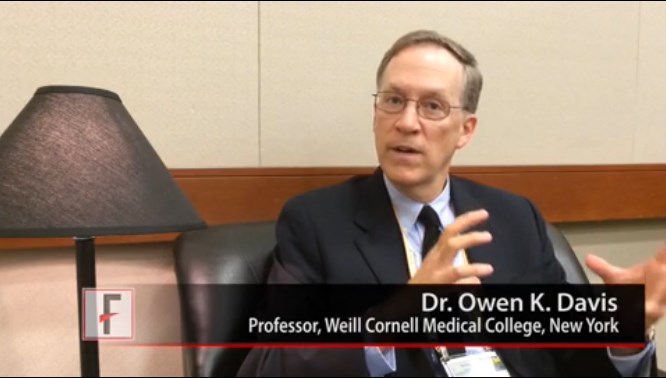User login
HONOLULU– A woman’s ovarian “clock” is dissociated from her general health, according to widely accepted thinking – but a new study has suggested the opposite.
That study showed greater cardiovascular risk in women with markers of greater ovarian aging. Dr. Marcelle I. Cedars of the University of California, San Francisco, and her associates presented the results at the annual meeting of the American Society for Reproductive Medicine, where the study won an award.
In a video interview, the society’s vice president, Dr. Owen K. Davis, described the potential significance of the study.
Women with cardiovascular disease tend to get diagnosed later and have worse outcomes, compared with men. If markers of ovarian function can help identify cardiovascular risk earlier in some women, the women may be candidates for more intensive surveillance, said Dr. Davis, professor of ob.gyn. and reproductive medicine at Weill Cornell Medical College, New York.
Dr. Davis reported having no financial disclosures.
The video associated with this article is no longer available on this site. Please view all of our videos on the MDedge YouTube channel
HONOLULU– A woman’s ovarian “clock” is dissociated from her general health, according to widely accepted thinking – but a new study has suggested the opposite.
That study showed greater cardiovascular risk in women with markers of greater ovarian aging. Dr. Marcelle I. Cedars of the University of California, San Francisco, and her associates presented the results at the annual meeting of the American Society for Reproductive Medicine, where the study won an award.
In a video interview, the society’s vice president, Dr. Owen K. Davis, described the potential significance of the study.
Women with cardiovascular disease tend to get diagnosed later and have worse outcomes, compared with men. If markers of ovarian function can help identify cardiovascular risk earlier in some women, the women may be candidates for more intensive surveillance, said Dr. Davis, professor of ob.gyn. and reproductive medicine at Weill Cornell Medical College, New York.
Dr. Davis reported having no financial disclosures.
The video associated with this article is no longer available on this site. Please view all of our videos on the MDedge YouTube channel
HONOLULU– A woman’s ovarian “clock” is dissociated from her general health, according to widely accepted thinking – but a new study has suggested the opposite.
That study showed greater cardiovascular risk in women with markers of greater ovarian aging. Dr. Marcelle I. Cedars of the University of California, San Francisco, and her associates presented the results at the annual meeting of the American Society for Reproductive Medicine, where the study won an award.
In a video interview, the society’s vice president, Dr. Owen K. Davis, described the potential significance of the study.
Women with cardiovascular disease tend to get diagnosed later and have worse outcomes, compared with men. If markers of ovarian function can help identify cardiovascular risk earlier in some women, the women may be candidates for more intensive surveillance, said Dr. Davis, professor of ob.gyn. and reproductive medicine at Weill Cornell Medical College, New York.
Dr. Davis reported having no financial disclosures.
The video associated with this article is no longer available on this site. Please view all of our videos on the MDedge YouTube channel
EXPERT ANALYSIS FROM ASRM 2014
